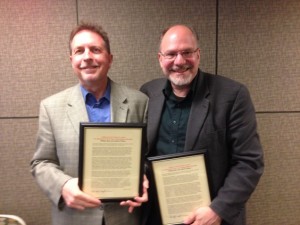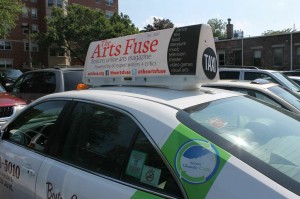Arts Fuse Editorial: The Magazine Heads into its Seventh Year — The State of the Fuse is Strong
It turns out that budding arts writers are anxious to learn how to master the demanding nuts and bolts of reviewing, especially given how few examples of first-rate criticism can be found in the increasingly all-thumbs mainstream media.
By Bill Marx.
The Arts Fuse enters its seventh year flying high, sailing through the streets by way of its first-ever advertisements on top of cabs in Boston. Reports from those lucky enough to glimpse the vehicles zoom by have been enthusiastic, ranging from the agreeably shocked to the downright overjoyed. Thanks to all those whose generous contributions to our fundraiser helped make this important attention-getting step possible. The aim of the four-wheeled PR effort is straightforward—to make more people aware of a (rare) online resource dedicated to producing professional, quality arts coverage at a time when cultural journalism in the mainstream/public news media (online and off-) is fading into extinction, blatant publicity, and terminal triviality.
Over the past year, a number of changes have been made to expand the breadth of The Arts Fuse’s mission to cover the arts with intelligence and independence. While the media giants are in retreat—or wilting at a steady pace—when it comes to generating serious cultural coverage, The Arts Fuse is on the move. The recent addition of our Fuse News feature gives our writers a valuable opportunity to react quickly to a variety of current topics via informative short pieces. So far our contributors have sent in informative news reports, pithy commentaries, trenchant reviews, nimble reactions to cultural controversies, incisive responses to debates about the arts elsewhere on the web, and illuminating perspectives on the death of major artists. The section has rapidly turned into a content bonanza—since its debut The Arts Fuse has posted a record number of 70 pieces a month. In the future, I plan to make more creative use of technology, such as video and podcast, to expand the reach of Fuse News.
A number of talented writers have recently been added to The Arts Fuse’s stable of 60 + critics and reporters. Among them I would like to single out Adam Ellsworth and Noah Schaffer on popular music, Glenn Rifkin on film, and Marcia Karp, Susan de Sola Rodstein, and John Taylor on books. The Arts Fuse has also welcomed on board some of the venerable writers left homeless by the lamentable demise of The Boston Phoenix—Gerald Peary, Peter Keough, and Jon Garelick. A vital part of the magazine’s long-term editorial strategy is to combine the efforts of veteran and rookie critics. The Arts Fuse is gathering together experienced critics—discarded by mainstream media/marketing machines no longer interested in supporting qualified arts writers—and encouraging them to interact with promising newbies who will benefit from lessons learned from old pros (including me) about the demanding craft of penning worthwhile criticism and arts coverage.
It turns out that budding arts writers are eager to be taught the demanding nuts and bolts of reviewing, especially given how few examples of first-rate criticism are published in an increasingly mercantile-minded mainstream media. It isn’t enough to see what arts criticism shouldn’t be on (too many) blogs—a time-wasting collection of pissing matches, character assassinations, and sales pitches. Young critics have to read, talk about, and explore what substantial reviewing can be.
Examples on The Arts Fuse of what incisive online cultural criticism and reportage can be were plentiful over the past year. I don’t want to post a long list—those interested should browse though our month-by-month archive. Here are a few of the highlights, with an eye on accenting our various approaches to arts coverage. Daniel Bosch’s “dispatches” from the six Norton Lectures given by artist William Kentridge at Harvard University are superb, while those looking for a model of the review as “balanced discrimination” should turn to Susan de Sola Rodstein’s beautifully modulated piece on James Longenbach’s The Virtues of Poetry. Steve Elman’s ongoing series of meditations on the forms taken by the jazz piano concerto blazes musicological trails. As for appreciations, Elman’s homage to the Aardvark Jazz Orchestra is a standout, as is Grace Dane Mazur’s marvelous visit to The Museum of Russian Icons. There are many substantial reviews to chose from—standouts range from Anthony Wallace’s discerning look at a volume of plays by major American writer Denis Johnson, George Scialabba’s evaluation of Jonathan I. Israel’s epic (three volume) study of the history of “Democratic Enlightenment,” and Justin Grosslight’s examination of Galileo’s Muse: Renaissance Mathematics and the Arts.
The Arts Fuse prides itself on offering an alternative to the mainstream media’s usual huckster approach—“We point thumb. You buy.”—to arts coverage. Some of the more memorable instances of naysaying on the magazine recently have been Noah Schaffer’s feisty disappointment at the line-up for the forthcoming “Out of the Box” Festival, Gerald Perry’s clear-eyed evaluation of the late film critic Roger Ebert, Jonathan Blumhofer’s questions about the artistic direction of the Boston Symphony Orchestra, and my ongoing series of commentaries on WGBH’s decision to diminish its jazz programming, dumb down its arts coverage, and duplicate the NPR news shows available on WBUR. And don’t forget the ruckus raised by me and others that arch-conservative zillionaire and Tea Party funder David Koch is one of the public radio station’s trustees.

Happy Awardees: Tony Wallace and I holding College of Arts & Sciences Award for Distinction in First-Year Undergraduate Education plaques.
As for the state of The Arts Fuse‘s Editor-in-Chief, I am robust but busy. I teach full time at Boston University, and that brings tremendous gratification but also puts considerable demands on my time. I recently won (with co-creator and co-teacher Anthony Wallace) the College of Arts & Sciences Award for Distinction in First-Year Undergraduate Education: “This highly competitive and richly deserved award . . . honors extraordinary dedication and effectiveness in the classroom and beyond, with special emphasis on distinctive contributions to the quality of the undergraduate First Year Experience.” One of the reasons I received this prize is my years of work of first creating and then shaping the direction of Theater Now, an innovative writing seminar that has grown into serving as the model for an Arts Now initiative at Boston University. These seminars are specifically designed to take students out of the classroom and into Boston’s cultural scene. In the future, I will write more on The Arts Fuse about this promising university-wide project because it connects with my interest in the arts and the ways we articulate their value.
When it comes to editing and writing for The Arts Fuse, I have never had more fun and satisfaction in my life, though I miss the days about a decade ago when—creating an award-winning online arts magazine for WBUR—I had a much, much bigger budget to draw on when reimbursing writers for their good work. Thus the continued health of The Arts Fuse depends on far more than the dedication of its gifted writers and staff (the latter include webmaster/jazz writer J.R. Carroll, copy editor/theater critic Alyssa Hall, and marketer/music commentator Charles McEnerney), but on you, our loyal readers. Please support a magazine that does its best to generate discussion rather than consumer tips.
Tagged:

